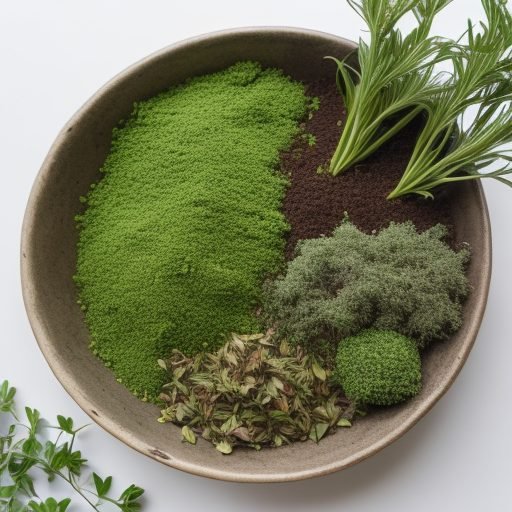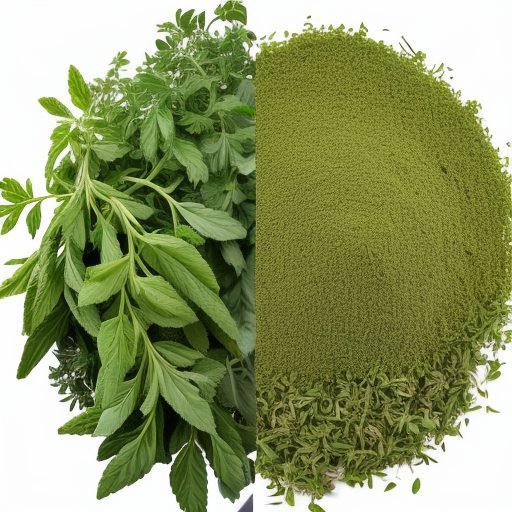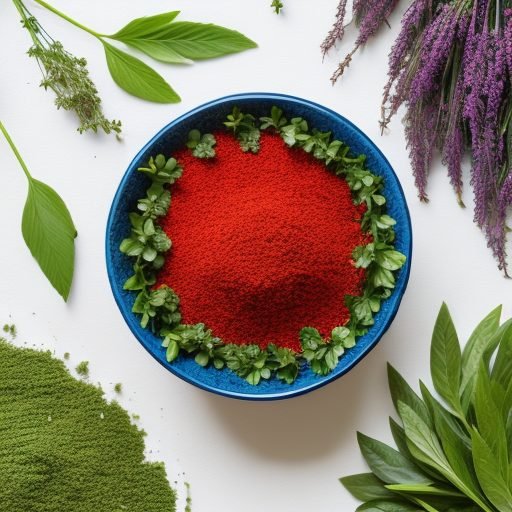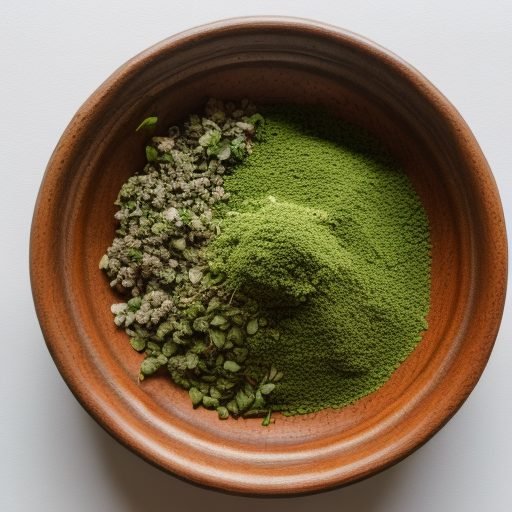Vegan Globetrotter is supported by our audience. When you purchase through one of our links, we may earn a small affiliate commission. As an Amazon Associate I earn from qualifying purchases. Your cost is not affected.
==================
Imagine a world where the cure for cancer lies in your backyard garden. In this article, we’ll reveal cancer-killing herbs with extraordinary powers. We’ll delve into tales of survival, hope, and nature’s hidden strengths against cancer. Discover how these humble plants can offer big solutions for health. Your path to understanding nature’s secrets starts here. Let’s begin!

The exploration of natural remedies for health issues has been part of human history for centuries, and the fight against cancer is no exception.
Herbs possess a variety of compounds that have been shown to have anti-cancer properties. Research into herbs like turmeric, known for its curcumin content, and green tea, with its powerful antioxidants, has suggested that certain herbs may play a role in cancer prevention and therapy.
As interest in holistic and complementary therapies grows, understanding the potential role of herbal medicine in cancer treatment becomes increasingly important. While herbs are not a cure-all, specific varieties have been recognized for their ability to fight cancer cells, support the body’s immune response, and relieve traditional cancer treatments’ side effects.
It’s important to consider how these cancer-killing herbs function within the body and to approach them with an awareness of their potency and the need for proper usage.
Key Takeaways
- Certain herbs contain compounds with potential anti-cancer properties.
- Herbal medicine can complement conventional cancer treatments and support immune function.
- Responsible use of cancer-killing herbs involves understanding their mechanisms, correct dosages, and safety precautions.
Understanding Cancer
When you explore the topic of cancer, a crucial starting point is to understand its biology and how it can progress within the body.

Biology of Cancer
Cancer originates from your own cells. It begins when the DNA within a cell becomes damaged, which can lead to uncontrolled cell growth. These cells differ from normal cells in several ways, such as an increased rate of division and the ability to invade neighboring tissues.
Cancer Development and Progression
The progression of cancer in your body follows a multi-step process known as tumorigenesis. Initially, cancer cells may remain localized in a stage called in situ. As these cells accumulate more mutations, they may gain the ability to invade surrounding tissues and spread to distant sites, a process known as metastasis.
Experience the comforting blend of
ingenuiTEA 2, crafted to complement your health journey, providing soothing support alongside conventional cancer treatments.
Herbal Medicine in Cancer Treatment
Herbal medicine is gaining recognition for its potential role in cancer treatment, both as a preventative measure and as an adjuvant to traditional cancer therapies.
Efficacy of Herbal Medicine
Research indicates that some herbs possess naturally occurring compounds with anti-cancer properties. For example, studies have found that compounds in thyme and oregano can suppress tumor development. The active ingredients in these herbs aim to target and inhibit the growth of cancer cells. Significant scientific work has focused on isolating these compounds to develop more potent therapeutic agents.
Integrating Herbs with Conventional Therapies
When it comes to integrating herbal medicine with conventional cancer treatments like chemotherapy and radiotherapy, it’s essential to do so under professional guidance.
Clinical studies have reported that certain herbal medicines, combined with traditional treatments, may improve patient outcomes. They can enhance survival, modulate the immune system, and improve the quality of life (Therapeutic Applications of Herbal Medicines for Cancer Patients). However, it’s crucial to consult with a healthcare provider to ensure safety and to avoid any adverse interactions.
Major Cancer-Fighting Herbs
The herbs listed below are recognized for their potential anti-cancer properties. Each herb presents unique compounds that have been researched for their efficacy in combating cancerous cells.
Turmeric
Curcumin, the active ingredient in turmeric, has been extensively studied for its ability to inhibit cancer cell growth and even destroy cancer cells. Your intake of turmeric could potentially reduce inflammation and act as an antioxidant.

Green Tea
Green tea contains powerful antioxidants called catechins that may help prevent cancer. Epigallocatechin-3-gallate (EGCG), in particular, is known for its strong anti-cancer effects.

Garlic
Garlic contains sulfur compounds that may initiate the death of cancer cells. Alicin, one of these compounds, can also support detoxifying enzymes in your body, helping to protect against cancer.

Oregano
Rich in anti-cancer compounds, oregano contains thymol and carvacrol. Research suggests that these constituents could suppress tumor development by targeting the pathways that cancer cells use for growth.

Saffron
Compounds found in saffron, especially crocin and safranal, show potential in inhibiting the growth of cancer cells, especially in leukemia and sarcoma.

Ginger
Gingerol, the main bioactive compound in ginger, is known for its anti-inflammatory and antioxidant effects. It has been shown to have anti-cancer properties that could help in the management of this disease.

Cayenne Pepper
Cayenne pepper contains capsaicin, an active component thought to have anti-cancer effects, especially linked to the death of cancer cells and the inhibition of cancer growth.

Again, try to experience the comforting blend of
ingenuiTEA 2, crafted to complement your health journey, providing soothing support alongside conventional cancer treatments.
Use in Cooking for Overall Health and Cancer Prevention
Incorporating certain cancer-killing herbs and spices into your cooking can promote overall health and potentially play a role in cancer prevention.

Turmeric, for instance, is recognized for its active compound, curcumin, which has been studied for its ability to inhibit the growth of cancer cells. Add a teaspoon of turmeric to your curries, soups, or smoothies for both color and health benefits.
Cayenne pepper contains capsaicin, an antioxidant that may help stifle cancerous cell growth. A dash of cayenne pepper can be sprinkled over your favorite dishes like eggs, popcorn, or dry rubs to turn up the heat and boost your antioxidant intake.
Here are a few key cancer-killing herbs and spices that you should consider adding to your dishes:
- Turmeric (Curcumin)
- Cayenne Pepper (Capsaicin)
- Ginger (Gingerol)
- Cinnamon (Cinnamaldehyde)
Different methods of cooking can also have an impact on the health benefits of foods.
Steaming vegetables, particularly broccoli, for up to five minutes, is the best way to retain the enzyme myrosinase, which is involved in the production of cancer-preventive compounds, as noted in a study presented by the American Institute for Cancer Research.

Remember, moderation is key when using strong flavors like cancer-killing herbs and spices. They are potent and can contribute greatly to not just the taste but also the potential health benefits of your meals.
Mechanisms of Action
Cancer-killing herbs have various mechanisms through which they exert anti-cancer effects. Understanding these can help you appreciate the potential of herbal medicine in cancer treatment strategies.
Inducing Apoptosis
Your body naturally eliminates cancer cells through a process known as apoptosis. Certain herbs can trigger apoptosis in cancer cells, thereby halting their growth and proliferation. For example, compounds like Vinca alkaloids are known for inducing these pathways that are often blocked in cancer cells, leading to their death and preventing tumor formation.
Inhibiting Angiogenesis
Angiogenesis is the formation of new blood vessels that tumors need to grow and spread. Some herbs are capable of inhibiting angiogenesis, effectively starving the tumor by cutting off its blood supply. This mechanism prevents the tumor from receiving the nutrients it needs to grow.
Detoxifying Carcinogens
The detoxification of carcinogens is another key action of certain herbs. By enhancing your body’s ability to break down and eliminate cancer-causing substances, these herbs reduce the likelihood of cell mutation and cancer development. This protection is crucial for maintaining cellular health and preventing the initiation of the cancer process.
Preparations and Dosages
When considering cancer-killing herbs to support cancer treatment, understanding how to prepare and dose these plants properly is essential. Both the form of the herb and its concentration can significantly affect efficacy and safety.
Extracts and Tinctures
Extracts and tinctures are potent forms of herbs created by concentrating the active compounds in alcohol or water. To use these effectively:
- Dosage – Typically, the dosage varies from 1-5 milliliters, taken 2-3 times daily, but always refer to the product’s label or a healthcare provider for guidance.
- Preparation – Purchase from reputable sources to ensure quality and concentration.
Infusions and Decoctions
Infusions are like tea but typically stronger, involving delicate parts of the herb, such as leaves or flowers. Decoctions involve simmering tougher parts like roots or bark.
- Infusions:
- Steep 1 teaspoon of the herb in 1 cup of hot water for 10-15 minutes.
- Strain and drink 1-3 times per day.
- Decoctions:
- Simmer 1 teaspoon of dried herb per cup of water for 15-30 minutes.
- Strain and consume as directed, usually 1-3 cups daily.
Safety and Precautions
While exploring the potential of cancer-killing herbs in cancer treatment, your safety must be paramount. It is essential to understand their interactions and potential adverse effects when used alongside conventional treatments.
Potential Herb-Drug Interactions
You should be aware that herbs can interact with cancer medications, potentially altering their effectiveness. For example, St. John’s Wort is known to interfere with the action of certain chemotherapy drugs. Consult with your healthcare provider before incorporating herbal remedies into your treatment plan.
- St. John’s Wort – Can reduce the effectiveness of chemotherapy drugs.
- Garlic – May enhance anticoagulant medications, affecting blood clotting.
Adverse Effects and Toxicity
Herbs, despite being natural, can have adverse effects or cause toxicity if not used correctly. For instance, excessive consumption of kava can lead to liver damage. Always adhere to recommended doses and under professional supervision.
- Kava – Linked to liver damage when overconsumed.
- Comfrey – Contains compounds that can cause liver toxicity.
Clinical Research and Case Studies
In evaluating the role of herbal medicines in cancer treatment, clinical research, and case studies offer invaluable insights into their therapeutic efficacy and application.
Published Clinical Trials
Clinical trials have documented the beneficial effects of certain herbal medicines when used in conjunction with conventional cancer treatments. For instance, a study reflected a positive impact on cancer patients’ survival, immune modulation, and quality of life with herbal medicines (Therapeutic Applications of Herbal Medicines for Cancer Patients). These trials are critical in understanding herb-based interventions and are subject to rigorous scientific methods to ensure the reliability and accuracy of the findings.
Ethnobotanical Approaches
Ethnobotanical studies explore how different cultures use plants for medicinal purposes, including cancer treatment. These approaches are often rooted in traditional knowledge and may guide modern clinical applications.
For example, certain herbal remedies have been long utilized for their anticancer properties and are now being scrutinized through a molecular lens, revealing the complex interactions at play (Recent advance of herbal medicines in cancer- a molecular approach). Ethnobotanical knowledge contributes to new drug discovery and supports the evidence-based use of herbal medicines in cancer care.
Video By: @curexa
Advancements in Herbal Therapy
Herbal therapy in cancer treatment is progressing, with significant research backing the efficacy of certain herbs and the development of novel formulations. These advancements offer promising avenues for supplementary cancer treatments.
Emerging Research
Recent studies suggest a pivotal role for certain cancer-killing herbs in the modulation of cellular processes crucial for cancer therapy. For example, the biological effects of spices, such as their ability to provoke changes in drug metabolism and cell division, have shown potential in cancer prevention and treatment. Notably, the antioxidant properties of these herbs are often credited for these effects.
Further exploration in this field is revealing how phytochemicals can impact molecular signaling pathways, enhancing the therapeutic arsenal against cancer. Read more about cellular process modulation.
Innovative Herbal Formulations
Innovations in herbal formulations are being tailored to combat cancer cells more effectively. There is a renewed interest in traditional herbal medicines and their role in cancer care. For instance, Zingiber officinale (ginger) is being incorporated into multiple Indian and Chinese herbal formulations, leading to targeted therapies that leverage specific pathways like MDM2 and mutant p53, enhancing the potential for precision medicine in oncology.
Moreover, natural compounds like allicin, isolated from garlic, can inhibit cancer cell proliferation and induce apoptosis. This demonstrates how single compounds can vastly influence therapeutic outcomes. Explore the potential of traditional herbal medicines in cancer care.
Supportive Care and Quality of Life
When you’re managing cancer, supportive care plays a vital role in improving your quality of life. It encompasses therapies targeting symptoms and overall well-being without directly addressing the cancer.
Alleviating Symptoms
Effectively managing symptoms such as fatigue, sleep disturbances, and digestive issues is crucial for maintaining your daily function and comfort. Herbal formulations have been studied for their potential in this area. For instance, certain herbs may aid in reducing gastrointestinal distress, thus improving digestive tract function. Similarly, some may find that specific herbal blends can help moderate sleep patterns and improve rest and recovery.
Enhancing Overall Well-Being
Beyond symptom management, the overall well-being of cancer patients is paramount. Cancer-killing herbs and supplements can be a part of an integrative approach in enhancing your quality of life. Research suggests that certain herbal therapies might improve the quality of life among cancer patients by influencing physiological and psychological aspects of health. Incorporating herbal medicine into your care routine should always be done under the guidance of a healthcare professional to ensure safe and appropriate use.
Wrapping It Up
Nature’s garden offers more than beauty. It holds potent allies in our fight against cancer. Through exploring these cancer-fighting herbs, we’ve seen how powerful and accessible natural remedies can be.

Remember, every plant has a story, and some may hold the key to the next big health breakthrough. Stay curious, keep exploring, and always embrace nature’s gifts. Share this knowledge, and let’s turn curiosity into action for a healthier tomorrow!
Frequently Asked Questions
Which plants have been scientifically proven to contain anti-cancer agents?
Several plants have undergone scientific studies and have been identified to contain compounds with anti-cancer properties. For example, the active ingredient in turmeric, curcumin, has demonstrated potential in reducing the spread of cancer cells. Additionally, green tea, with its rich content of catechins, has been associated with a lower risk of certain types of cancer.
What natural substances are effective at targeting cancer cells?
Natural substances such as paclitaxel, originally derived from the bark of the Pacific yew tree, are effective in targeting and killing cancer cells. Another substance, vincristine from the periwinkle plant, is also utilized in cancer therapy for its cell division-inhibiting effects.
How can certain herbs contribute to cancer prevention and treatment?
Herbs can contribute to cancer prevention and treatment by providing antioxidants that protect cells from damage, enhancing the immune system, and sometimes by directly inhibiting cancer cell growth. Herbal remedies may also be used to alleviate the side effects of conventional cancer treatments.
Are there any herbs that have been used traditionally for combating cancer?
Yes, traditional medicine systems across the world have utilized various herbs to combat cancer. For instance, traditional Chinese medicine often includes the use of herbs like astragalus and ginseng which have shown promise in supportive cancer care. It’s important to consult with healthcare professionals when considering these options.
Learn Vegan Cooking With Us!
Discover the various vegan dishes with Vegan Globetrotter. Learn aromatic and appetizing vegan dishes that blend flavor, health, and simplicity. Stay connected and enhance your vegan cooking skills:
- Facebook: Vegan Globetrotter
- Instagram: @_veganglobetrotter
- Pinterest: The Vegan Globetrotter
- Twitter: @VeganGlobetrot
Join our community and explore the wonders of vegan cooking! For more insights into the world of vegan cooking, visit our website: veganglobetrotter.com



Don't miss out
when new recipes and information are added!
Join our newsletter for free recipes,
healthy living inspiration, and special offers
You have Successfully Subscribed!